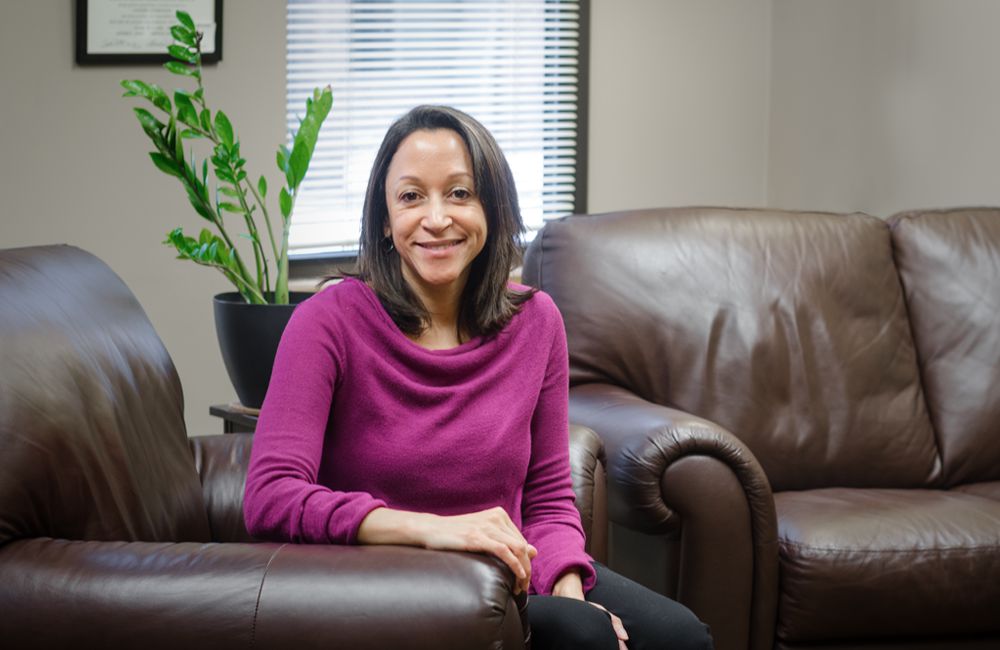Clinical psychologist Jordan Hart sees adolescents, adults, and parents at her office in St. Louis Park every day. In private practice for 10 years, Hart still thinks back often to the work and research she did during her doctoral program in clinical psychology and child development.
One example is her study and research on attachment theory, which examines how relationships formed early in a child’s life affect them later on.
“That is something I think about every day in the work that I do,” says Hart. “We learned so much about the foundations of attachment theory—how it affects kids and how it affects adults.”
It’s common for Hart to see both adolescents and adults who are still feeling the effects of things that happened during their childhoods. According to attachment theory, whether or not a young child has trusting relationships with their parents influences what they expect from relationships in their adult life. Hart sees effects that cover a broad spectrum of people and circumstances.
Her time in the Institute of Child Development in CEHD prepared Hart to tackle a wide variety of psychological issues with her clients.
“The basics of child development were instilled in us. It’s such a nice background for me to have in the work that I do.”
Before Hart came to the University of Minnesota, she earned her bachelor’s degree at Macalester College and spent two years at the National Institute of Child Health and Human Development in Washington, D.C. A desire to work in Washington led her to apply to several NIH programs, and her placement in the child health and human development sector sparked her interest in exploring that field at a doctoral level.
“I was a psychology major, I knew I liked child development, and then my career and choices just took off after that summer,” Hart says.
Her teachers and mentors at ICD inspired her passion for the clinical work she eventually pursued.
“I’ve always liked working with kids and families. . . It’s something I do well and love to do,” says Hart. “And I was trained by some of the top people in their fields who were passionate about teaching and research and practice.”
Hart felt especially inspired by child development professor Megan Gunnar, who was a young professor with her own lab when they met, balancing teaching, research, and raising her own children.
“She did so much to nurture our careers from the moment we walked in the door,” Hart says. “All along, I’ve had great mentors who were really invested in making sure I was on the right path.”
Getting a good start
Over her 20 years as a clinician, Hart says she sees more children and college students coming in for help with anxiety- and depression-related issues. It’s not necessarily that depression and anxiety have increased in young people, she says, but that people are more open and willing to ask for help.
Hart appreciates the increased openness she sees in clients now, especially parents of young children.
“It’s reassuring that families just want a boost and to get a good start with their kids and make sure their parenting is on track,” she says.
For example, if a parent is having trouble putting a child to bed, it doesn’t mean their child has anxiety. But Hart is still happy to help.
“We can do it in such a way that we don’t pathologize every reason they’re coming,” she explains.
Knowing she provides support for the children and parents she sees is fulfilling. Hart also values the support she gets from relationships formed with classmates and faculty while she was a student.
“I’m still in contact with all of my graduate school cohort. It was a tough time—we were busy, classes were hard, it was demanding—but great people were drawn to the U.”
Hart’s time at the University helped her explore her options and eventually find the career she wanted to pursue long-term. Though it’s easy to get caught up worrying about things like grades, she says, what’s really important is to make the most of the time you have in grad school.
“There are so many opportunities,” she says. “If there’s a professor that’s got some research you’re interested in, don’t be afraid to go do that—just delve in.”
Learn more about Jordan Hart and the Institute of Child Development.
Story by Ellen Fee | February 2016
